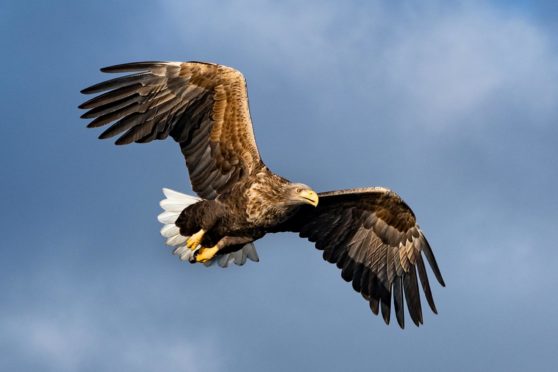A sea eagle found dead on the Isle of Skye has tested positive for Avian Flu.
An adult bird from a long-established territory was found dead in on the island at Trotternish on November 14.
Upon analysis by the Scotland’s Rural College pathology unit the eagle – Britain’s biggest bird of prey – tested positive for Avian influenza, said local ornithology website Skye Birds.
Full details are awaiting publication by the Animal Plant and Health Agency, but it is thought to be the first case in Scotland involving a White-tailed Eagle.
“The fact the species will feed on Greylag Goose may be an explanation behind the death,” said the authoritative Bird Guides.
Other positive cases
Last week it was announced that a flock of free-range hens from a commercial premises near Gretna, Dumfriesshire, Dumfries and Galloway, tested positive for highly pathogenic avian influenza H5N1.
In order to limit the further spread of disease, appropriate restrictions have been imposed on the premises and any identified contact premises, plus the area of the Surveillance Zone, which overlaps into other regions.
The remaining birds at the site have been humanely culled.
Within these zones, a range of different controls are now in place. These include restrictions on the movement of poultry, carcasses, eggs, used poultry litter and manure, and restrictions on bird gatherings.
“We ask that the public remain vigilant”
Producers and bird keepers are being reminded to comply with the Order to house birds, which came in to effect on November 29, or to ensure their birds are kept separate from wild birds. Bird keepers must ensure they follow biosecurity procedures.
Rural Affairs Secretary Mairi Gougeon said: “With the recent disease confirmations in wild and captive birds across the UK, it is not unexpected for avian influenza to be found in birds here in Scotland.
“We ask that the public remain vigilant and report any findings of dead wild birds to Defra’s national telephone helpline. Do not touch or pick up any dead or sick birds that you find.”
Scotland’s Chief Veterinary Officer Sheila Voas said: “We have already made clear that all bird keepers – whether major businesses or small keepers with just a few birds – must ensure that their biosecurity is up to scratch to protect their birds from disease and prevent any contact between their birds and wild birds.
“Keepers who are concerned about the health or welfare of their flock should seek veterinary advice immediately. Your private vet, or your local Animal and Plant Health Agency office, will also be able to provide practical advice on keeping your birds safe from infection.
“Any dead wild swans, geese, ducks or birds of prey, or five or more dead wild birds of other species (including gulls) in the same location at the same time, should be reported to Defra’s national telephone helpline.
“Public health advice is that the risk to human health from the virus is very low and food standards bodies advise that avian influenzas pose a very low food safety risk for UK consumers, and it does not affect the consumption of poultry products including eggs.”
